In the realm of web scraping and data extraction having the skill to parse HTML is crucial. Whether you’re a data scientist, a web developer or simply someone with an interest in this field knowing how to parse HTML using Python can greatly boost your ability to collect and analyze web based information.
This article will delve into the concept of a parser HTML Python factors to consider when selecting an HTML parsing library and provide an overview of the top five HTML parsers currently in use. By the conclusion of this guide you’ll have a clear grasp of which tools are most suitable, for your requirements and how to incorporate them into your projects.
Python is supported by a very large community and therefore it comes with multiple options for parsing html.
What Is an HTML Parser?
An HTML parser functions as a software element that interprets HTML code and converts it into a format that’s easy to read. This procedure includes changing the HTML into an organized document that can be navigated and controlled programmatically with ease. HTML parsers play a role in web scraping, enabling developers to retrieve particular information from web pages like text, images and hyperlinks.
HTML parsers function, by dissecting the HTML document into its components: tags, attributes and content. Subsequently they construct a tree framework referred to as the Document Object Model (DOM) illustrating the arrangement of the HTML elements. This organized layout simplifies the process of locating and retrieving elements from the document.
Elements to Consider When Evaluating the Best HTML Parsing Libraries
When deciding on an HTML parsing library it’s important to take into account factors to make sure you pick the right tool, for your specific requirements:
- Ease of use: The library needs to have an API that is user friendly and accessible especially for those new, to it.
- Performance: Parsing speed and effectiveness are vital particularly when handling HTML files or extracting data, from numerous web pages.
- Compatibility: The library needs to work with different versions of Python and be able to support a variety of HTML standards.
- Documentation and Community Support: Having documentation and a vibrant community can really improve your overall experience and offer helpful resources, for solving issues.
- Additional Features: Certain libraries provide functionalities like automatically managing improperly formatted HTML, CSS selectors and linking with other tools used for web scraping.
Top 5 HTML Parsers
1. Beautiful Soup
Beautiful Soup stands out as a favored HTML parsing tool in the Python community. Its reputation for simplicity and user friendliness makes it a top pick for those to programming. This library constructs a representation of the HTML content enabling effortless navigation and search capabilities, within the document. Moreover Beautiful Soup offers parsing techniques and adeptly manages imperfect HTML structures with finesse.
Pros:
- Different underlying parsers
- One of the most widely used HTML parsing libraries
- HTML and XML code formatting capabilities
- Fast releases
Cons:
- No API documentation
- No native support for XPath
Programming language: Python
GitHub stars: — (not on GitHub)
CSS selector support: Yes
XPath support: Not natively, but possible
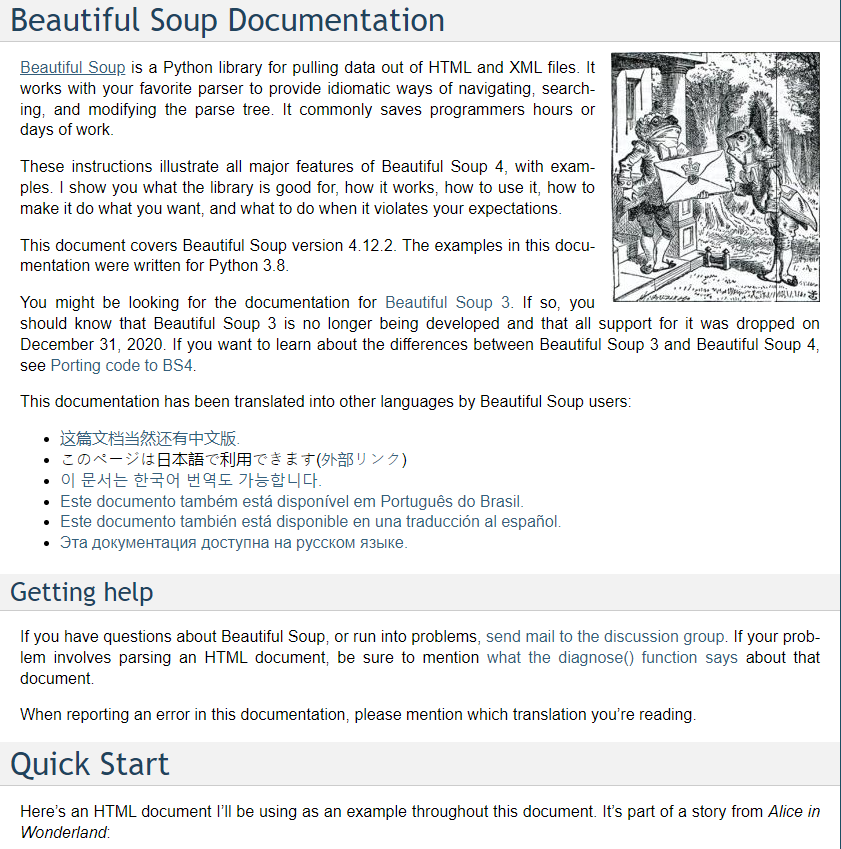
Key Features:
- User-friendly API
- Supports various parsers, including lxml and html5lib
- Handles malformed HTML
- Excellent documentation and community support
from bs4 import BeautifulSoup
html_doc = "<html><head><title>Test</title></head><body><p>Hello, World!</p></body></html>"
soup = BeautifulSoup(html_doc, 'html.parser')
print(soup.title.string)
2. jsoup
jsoup, an HTML parser built in Java is commonly integrated into Python projects using the Py4J library. It offers an versatile interface for extracting and managing information from HTML files. Known for its efficiency and precision jsoup is a favored tool, for handling web scraping assignments.
Pros:
- Implements the WHATWG HTML specification
- HTTP client included in the library
- Vast API with a lot of methods and utilities
- Full API documentation available online
Cons:
- Not the fastest HTML parser
Programming language: Java
GitHub stars: 10.5k
CSS selector support: Yes
XPath support: Yes
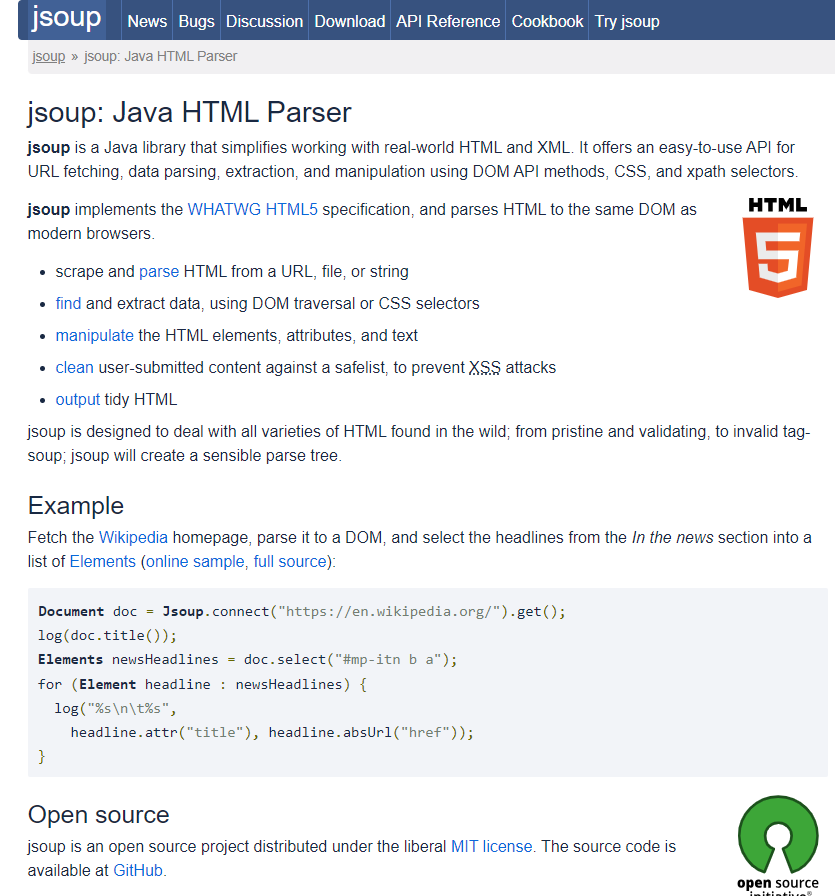
Key Features:
- High performance
- Flexible and powerful API
- Handles HTML and XML
- Robust against malformed HTML
from py4j.java_gateway import JavaGateway
gateway = JavaGateway()
jsoup = gateway.jvm.org.jsoup.Jsoup
document = jsoup.parse("<html><head><title>Test</title></head><body><p>Hello, World!</p></body></html>")
title = document.title()
print(title)
3. Nokogiri
Nokogiri is a parser for HTML and XML in the Ruby programming language and it can also be integrated into Python projects using a connecting library. Known for its efficiency Nokogiri excels, in navigating HTML layouts and provides robust search functions using CSS selectors and XPath.
Pros:
- Secure by default as it treats all documents as untrusted
- CSS3 selectors, with some jQuery-like extensions
- Full API documentation
- Community-maintained cheat sheet
Cons:
- Not the most used HTML parsing library
Programming language: Ruby
GitHub stars: 6.1k
CSS selector support: Yes
XPath support: Yes
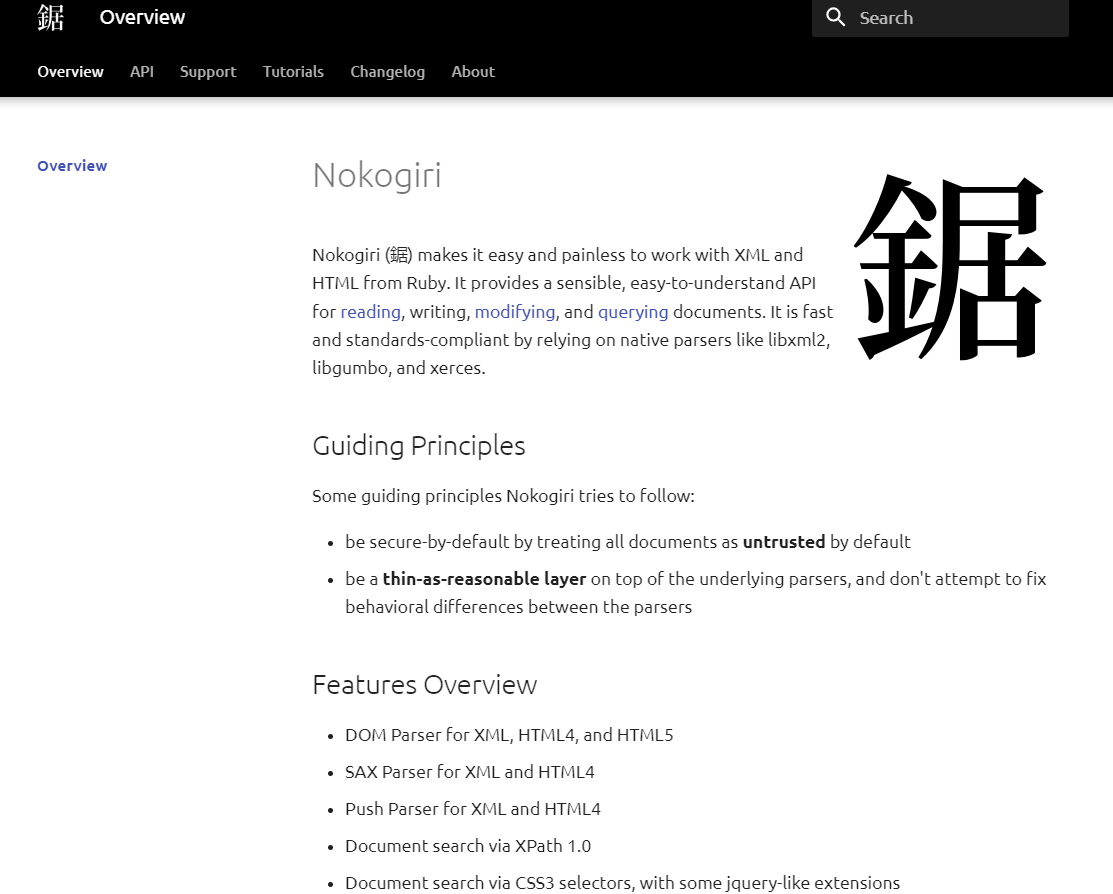
Key Features:
- High performance and accuracy
- Support for CSS selectors and XPath
- Handles HTML and XML
- Active community and excellent documentation
from lxml import etree
html_doc = "<html><head><title>Test</title></head><body><p>Hello, World!</p></body></html>"
parser = etree.HTMLParser()
tree = etree.fromstring(html_doc, parser)
title = tree.find(".//title").text
print(title)
4. Cheerio
Cheerio is an adaptable HTML parser designed for Node.js yet it is also compatible with Python projects via the PyNode library. It offers a syntax to jQuery, for navigating and editing HTML, which appeals to developers who appreciate a familiar interface.
Pros:
- jQuery-like syntax
- Great performance
Cons:
- Still in beta
- No XPath native support
Programming language: JavaScript (Node.js)
GitHub stars: 27.6k
CSS selector support: Yes
XPath support: No
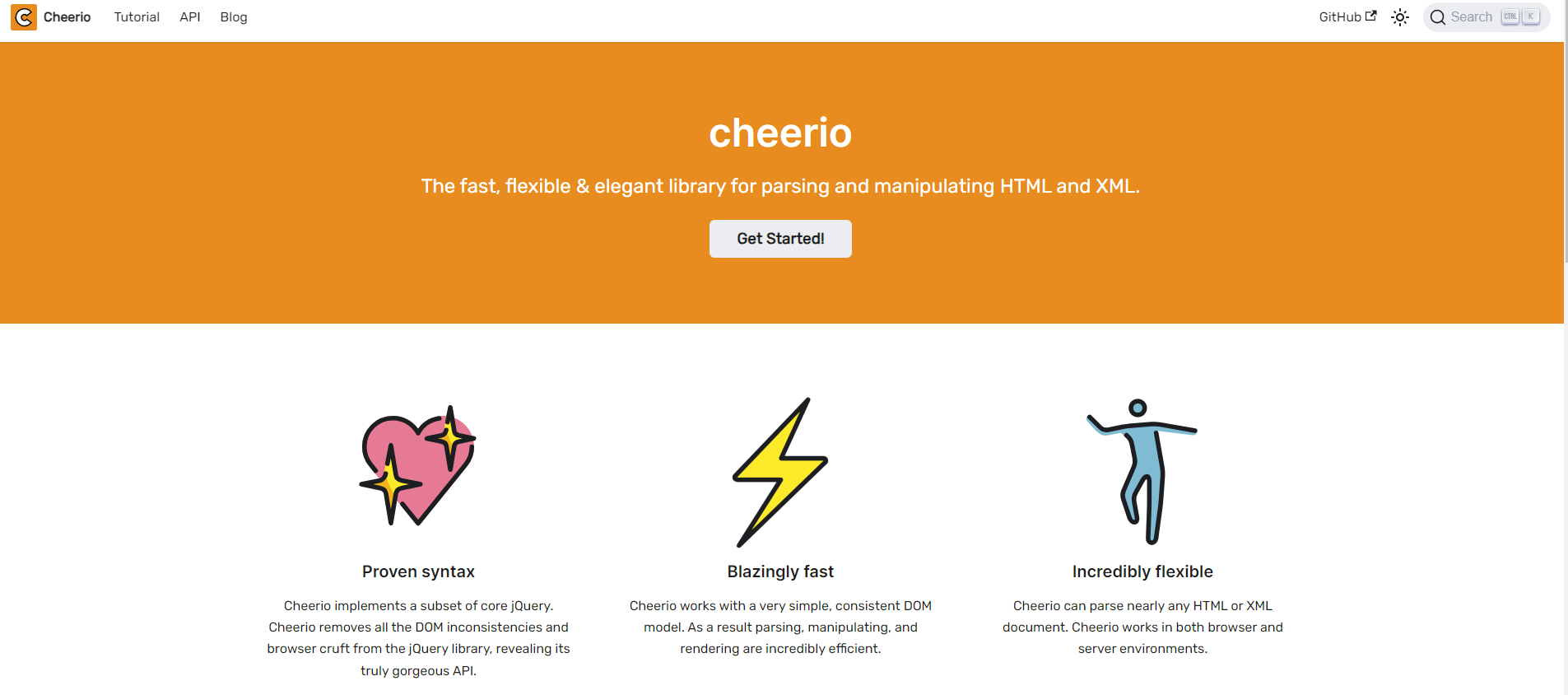
Key Features:
- jQuery-like syntax
- Fast and efficient
- Supports CSS selectors
- Active community and robust documentation
from pynode.main import node_run
node_run("""
const cheerio = require('cheerio');
const html = '<html><head><title>Test</title></head><body><p>Hello, World!</p></body></html>';
const $ = cheerio.load(html);
console.log($('title').text());
""")
5. html5lib
html5lib is a Python library that purely parses HTML documents based on the HTML5 standard. It is recognized for its adherence, to web guidelines and capability to manage structured HTML. Html5lib constructs a DOM tree that can be modified using different techniques.
Pros:
- Supports all HTML5 features and works across various browsers.
- Adheres strictly to the HTML5 specification for parsing.
- Easy to use within Python projects.
- Actively maintained with a strong community for support and updates.
Cons:
- Slower compared to some other parsers due to strict specification adherence.
- Primarily designed for Python, with less support for other languages.
- May require additional dependencies, increasing project complexity.
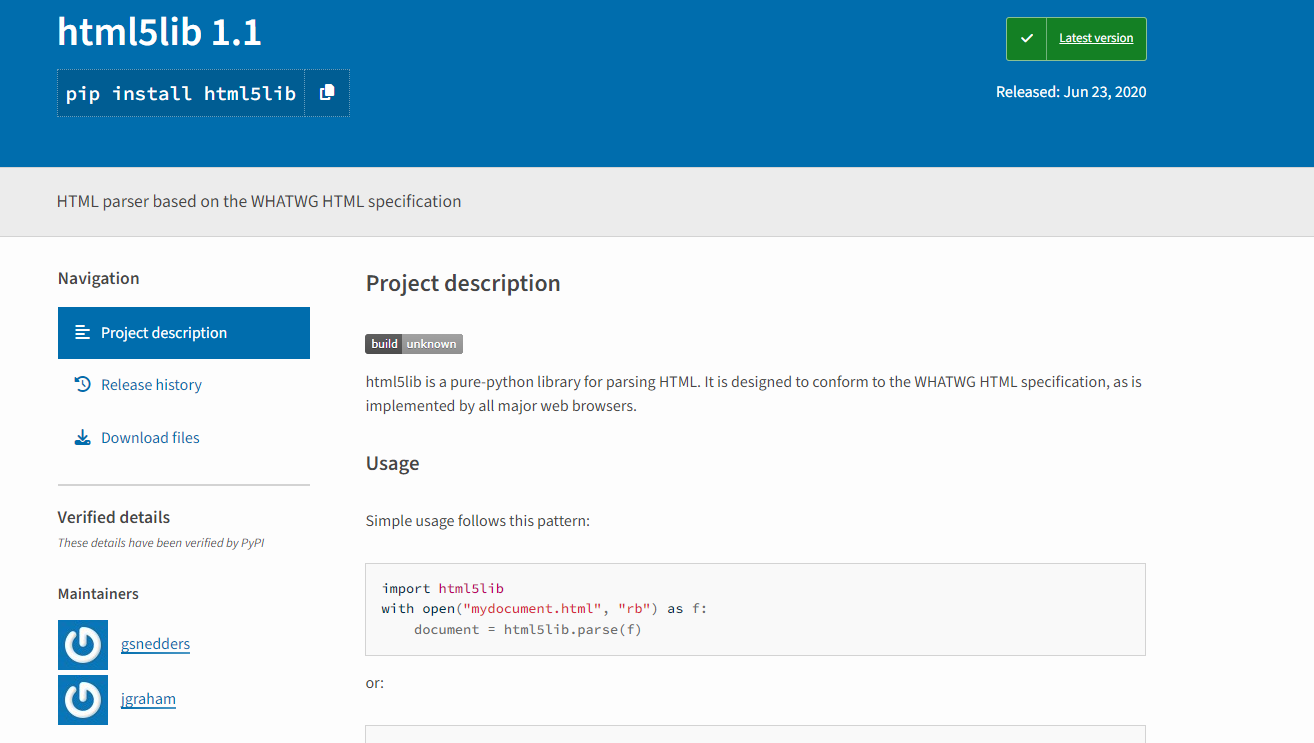
Key Features:
- Full compliance with HTML5 standards
- Handles malformed HTML
- Creates a complete DOM tree
- Pure Python implementation
import html5lib
html_doc = "<html><head><title>Test</title></head><body><p>Hello, World!</p></body></html>"
tree = html5lib.parse(html_doc)
print(tree.getElementsByTagName('title')[0].firstChild.data)
Conclusion
Selecting the HTML parser for your Python projects relies on your specific requirements and the intricacy of the tasks you are tackling. Beginners often find Beautiful Soup appealing because of its simplicity and user friendly nature while jsoup and Nokogiri cater to intricate projects by offering superior performance and flexibility.
Cheerio presents a jQuery syntax that feels familiar to those transitioning from JavaScript whereas html5lib ensures adherence, to HTML5 standards. By grasping the strengths and functionalities of each library you can make a informed choice and elevate your web scraping capabilities.
Discover how IPWAY’s innovative solutions can revolutionize your parsing experience for a better and more efficient approach.
